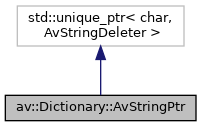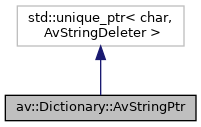RAII holder for strings allocated by FFmpeg internals. More...
#include <dictionary.h>
Inheritance diagram for av::Dictionary::AvStringPtr:

Collaboration diagram for av::Dictionary::AvStringPtr:

Public Types | |
| using | base_class = std::unique_ptr< char, AvStringDeleter > |
Public Member Functions | |
| char * | c_str () const noexcept |
Access to the holded string with std::string interface. More... | |
| size_t | length () const noexcept |
| RAW string length in bytes. More... | |
| char & | operator[] (size_t index) const noexcept |
| Array-like char access. More... | |
Detailed Description
RAII holder for strings allocated by FFmpeg internals.
Member Typedef Documentation
◆ base_class
| using av::Dictionary::AvStringPtr::base_class = std::unique_ptr<char, AvStringDeleter> |
Member Function Documentation
◆ c_str()
|
inlinenoexcept |
Access to the holded string with std::string interface.
- Returns
- holded raw string pointer, or
nullptrif string is not allocated
◆ length()
|
inlinenoexcept |
RAW string length in bytes.
- Note
- to avoid extra size and keeps
sizeof(AvStringPtr) == sizeof(char*)we do not cache and holds string size. As a result string length calculates every call and complexity isO(n), wheren- count of bytes in string exclude end zero.
8-bit based multibyte string like UTF-8 must be processes with appropriate libraries externally.
- Returns
- calculated length of string in bytes
◆ operator[]()
|
inlinenoexcept |
Array-like char access.
This call avoid any checks. When index is greater then length() behavior undefined.
- Parameters
-
index char index to access
- Returns
- char reference to read/modify.
The documentation for this struct was generated from the following file:
- src/dictionary.h